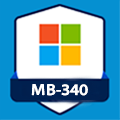Clientele ➞
























Candidates for this exam design, configure, and manage Dynamics 365 Commerce and provide
ongoing support for the app.
Candidates have a strong understanding of unified commerce business operations. They may
have experience deploying, using, and maintaining Dynamics 365 Commerce.
Module 1: Configure prerequisites and commerce parameters
Describe and configure additional functionality
Configure Distributed Order Management (DOM)
Module 2: Configure products, prices, discounts, loyalty, and affiliations
Configure products and merchandising
Configure retail stores
Manage call centers
A Certified Microsoft Azure Trainer
Our Partners
